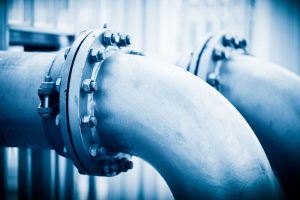
To decommission the Fukushima nuclear power plant, the water in the reactor must be emptied through a network of pipes designed specifically for this purpose. The pipes will be in contact with a substantial flow of contaminated water, augmenting the risk of corrosion at certain points along the network. Top Japanese researchers (from Tohoku, Gunma, and Kobe Universities) work with List, a member of the Carnot Network, on the PYRAMID project, funded in part by France’s national research agency ANR, to develop NDT methods to monitor corrosion remotely.
Right-angled elbow joints are the most likely to suffer from accelerated corrosion. These welded joints are notoriously difficult to inspect due to the combined effects of the corrosion, weld bumps, the “elbow” shape, and the fluid flowing through the pipes. Because of the difficult access, the probes used to monitor the welds cannot be moved once they are in place. The researchers chose electromagnetic acoustic transducers (EMAT), which, because no other substances are required to couple the probe and the pipe, are well-suited to this type of scenario.
The guided waves emitted by the probes and the propagation of the waves through the elbow joints are simulated using 3D finite-element models developed by List. The simulator is coupled with a fast analytical model to predict the waves’ behavior in the straight sections of piping located before and after the elbow joint. The resulting hybrid method, called SAFE-FEM, has already been integrated into the CIVA suite. The additional developments completed for Fukushima will ultimately be added to CIVA.
Read article at http://www.cea-tech.fr/